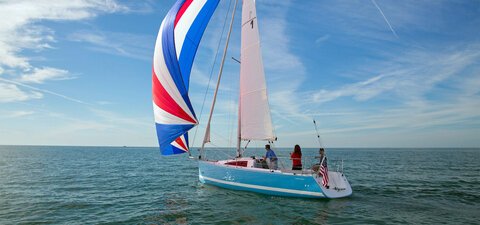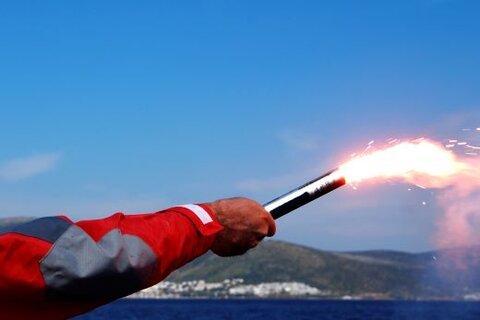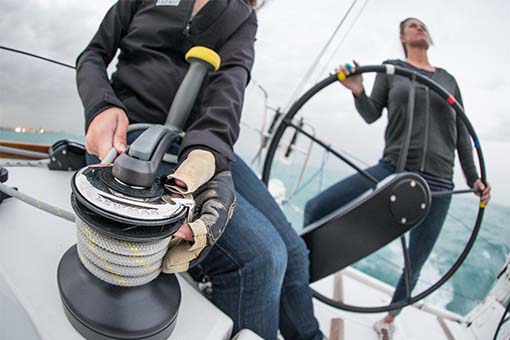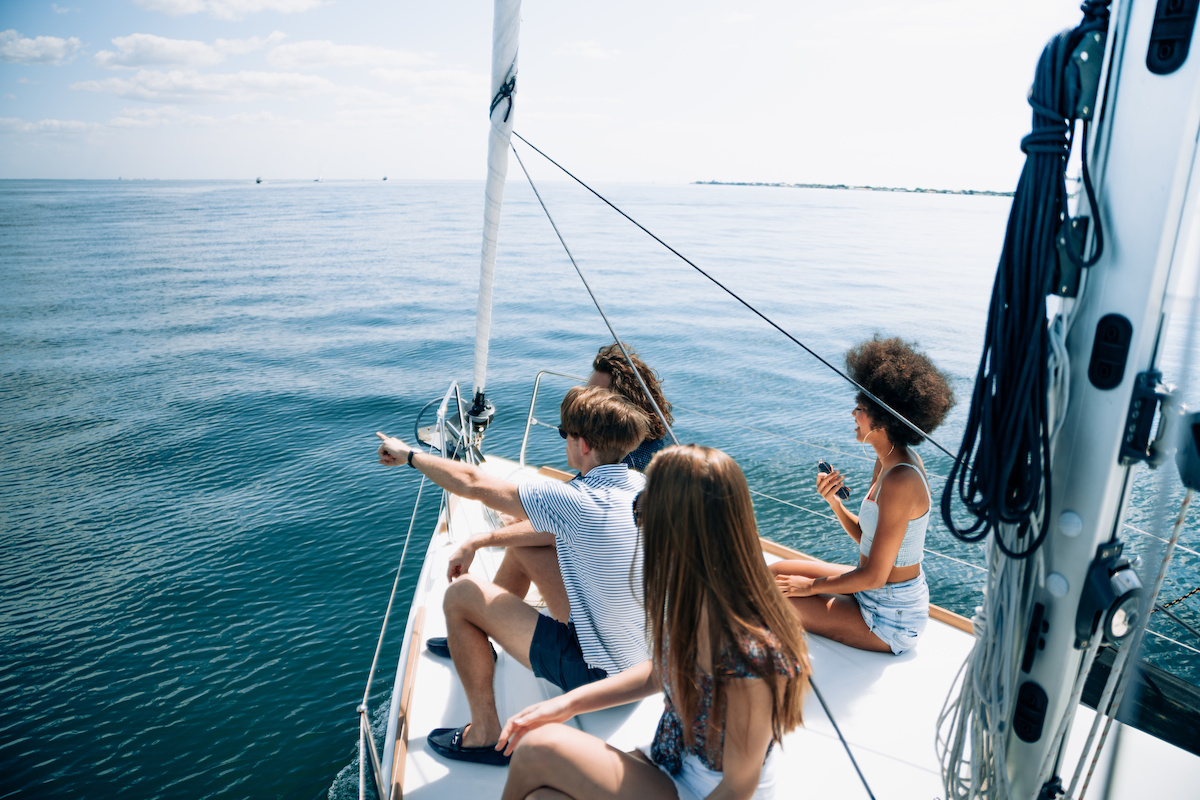Sailing is an adventure that demands preparation. Whether you're a seasoned sailor or a novice, having the right sailboat supplies onboard ensures a safe and enjoyable experience.
But what essential tools do you need to bring on your sailboat? This guide covers all the must-have sailboat gear for every voyage, from safety gear to navigation tools.
What is Required on a Sailboat?
Failure to carry some of the items featured in the list below could result in fines or penalties. Therefore, you should always check USCG regulations before setting sail.
Meeting USCG regulations, being prepared for emergencies, and carrying essential navigation tools will help you sail confidently.
1. Personal Flotation Devices (PFDs)
When going sailing, safety must always come first. U.S. Coast Guard regulations require that all passengers have an approved life jacket. Make sure your PFDs fit properly and are easily accessible. Consider inflatable PFDs for comfort during long trips.
2. VHF Marine Radio
A VHF radio is the primary means of communication at sea. Whether for routine check-ins or emergencies, this is a must-have sailboat accessory.
3. Fire Extinguishers
A fire on a boat can escalate quickly. Always have at least one U.S. Coast Guard-approved fire extinguisher on board. Ensure all passengers know where the fire extinguisher is and how to use it. Keep extras accessible in the cockpit and staterooms beyond the engine room and galley.
4. First-Aid Kit
Accidents happen, and a well-stocked marine first-aid kit is essential. Include bandages, antiseptics, seasickness medication, pain relievers, and any necessary prescription medications.
5. Visual Distress Signals (Flares, Signal Mirror, Flashlight)
Having Coast Guard-approved flares or electronic visual distress signals (eVDSDs) can be life-saving in emergencies. A signal mirror and waterproof flashlight are also helpful in attracting attention if needed.
6. Throwable Flotation Device
A throwable flotation device, such as a life ring or buoy, should be within reach in case someone falls overboard.
7. Navigation Equipment (Charts, GPS, Compass, Barometer)
Even with modern GPS technology, carrying updated nautical charts and a reliable compass is crucial for backup navigation. A barometer can provide early warning of changing weather conditions.
8. Harnesses and Jacklines
For offshore or rough-weather sailing, a safety harness and jacklines keep crew members securely tethered to the boat. Some inflatable PFDs include built-in D-rings that double as harnesses.
9. Anchor and Rode
An appropriately sized anchor with enough rode (line and chain) is essential for securing your boat, whether in an emergency or at a planned anchorage.
10. Bilge Pump and Manual Backup
Water can accumulate in your bilge from rain, leaks, or rough seas. A reliable bilge pump and a manual backup ensure that water is efficiently removed.
11. Sound Signaling Devices (Horn, Whistle, or Bell)
A sound signaling device is critical for communicating in fog, low visibility, or emergencies.
12. Tool Kit and Spare Parts
A well-stocked tool kit with the following items can save you from mechanical failures at sea:
- Wrenches
- Screwdrivers
- Electrical tape
- Spare sailboat parts (extra fuses, fuel filters, impellers)
You should also include a mask and snorkel to clear debris from the keel or rudder.
13. Emergency Tiller
If your primary steering system fails, an emergency tiller can help you maintain control of your boat.
14. Liferaft or Dinghy
For offshore sailing, a certified liferaft or dinghy provides an emergency flotation platform in case of disaster.
15. Towing Line and Bridle
If you tow a dinghy, a tow line and bridle keep it stable behind your sailboat. The polypropylene line that floats reduces the risk of entanglement with the propeller.
16. Docking and Mooring Lines
Strong docking lines are necessary for securing your sailboat at docks and marinas. Carry extra lines for unexpected situations.
17. Fenders
Fenders protect your boat's hull from damage when docking or mooring alongside other vessels.
18. Safety Knife and Multi-Tool
A sharp safety knife and multi-tool can help with tasks such as:
- Rope cutting
- Repairs
- Emergencies
19. Drinking Water and Food Supplies
Always carry extra potable water and non-perishable food in case of delays or emergencies.
20. Marine Head and Waste Management System
A proper sanitation system or portable marine toilet ensures compliance with regulations and maintains onboard hygiene.
21. Sunscreen and Insect Repellent
Protect yourself from sunburn and bug bites with high-SPF sunscreen and marine-friendly insect repellent.
22. Boarding Ladder
A boarding ladder makes it easier to re-enter the boat from the water, especially after swimming or emergencies.
23. Radar Reflector
A radar reflector increases your sailboat's visibility to larger vessels, reducing collision risks in low-visibility conditions.
24. Dry Bags and Waterproof Containers
Keep electronics, documents, and personal items safe from water damage using dry bags and waterproof cases.
25. LED Headlamps and Extra Batteries
Having hands-free lighting is invaluable for night sailing, maintenance, and emergencies.
26. Storm Jib
A storm jib is a small, durable headsail that helps maintain control and forward momentum in heavy winds and rough seas.
27. Whisker Pole
A whisker pole keeps the headsail open when sailing downwind, maximizing wind capture and preventing sail flogging.
28. Bosun's Chair
A bosun's chair allows crew members to safely ascend the mast for maintenance, sail adjustments, or rigging inspections.
29. Cable Cutters
In case of a dismasting, cable cutters allow you to quickly cut away rigging to prevent hull damage.
30. Awning for the Cockpit
A boom-mounted awning or tarp offers shade and protection from rain when at anchor.
31. Ventilation Scoop
A ventilation scoop directs airflow into the cabin, reducing heat and humidity inside the boat.
32. Folding Seats
Folding fabric seats with backrests provide comfortable seating on deck without occupying much storage space.
33. Hats, Gloves, and Sunscreen
Protect yourself from the elements with wide-brimmed hats, sailing gloves, and plenty of sunscreen.
34. Satellite Communication Device
For extended offshore voyages or remote areas without VHF coverage, a satellite communication device allows sailors to:
- Send messages
- Access weather updates
- Call for help in emergencies
35. Manual Water Desalinator (Portable Watermaker)
In case of extended stays at sea or emergencies, a manual water desalinator can provide drinkable water from seawater. This will ensure hydration when fresh water supplies run low.
Conclusion: Pack These Items to Sail with Confidence
When considering what you need on your sailboat, focus on safety, navigation, and comfort. Equipping your boat with these essential sailboat supplies lets you confidently sail, knowing you're prepared for anything.





